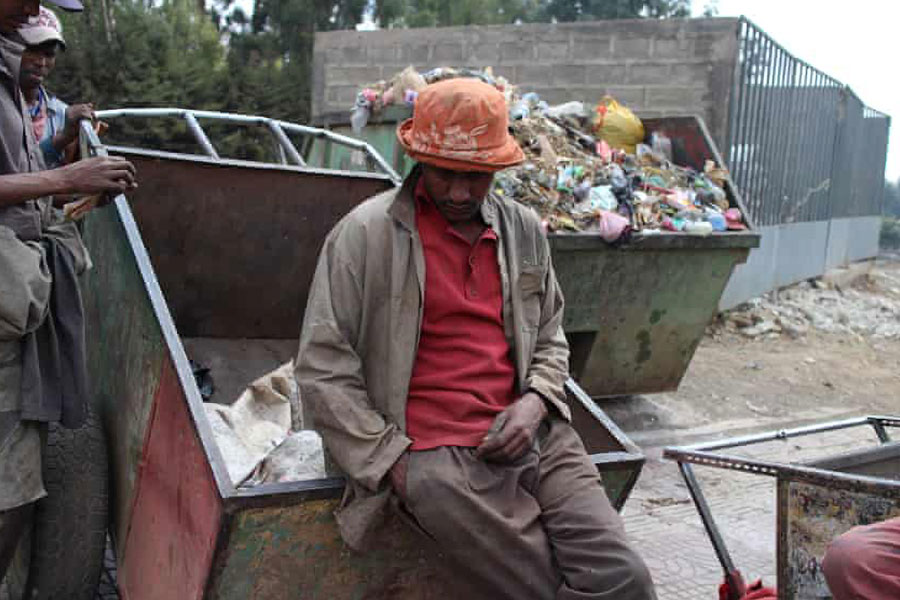
Radar | Jan 12,2019
Dec 4 , 2020
By Eden Sahle
Acts of inhumanity are becoming all too normalised these days. They shake us to the core at first, but their regularisation makes it likely that we do not respond with the appropriate level of outrage that we need to. The climax of this inhumanity seems to be the massacre that occurred in the town of Mai Kadra, Tigray Regional State, taking the lives of hundreds of innocent civilians.
With such disturbing acts occurring, we seem to have forgotten about issues that would have outraged us in normal times. This has to do with complaints from people with orgins in the Tigray region, who have reported being profiled based on their identity. They say that their perceived ethnic origin has made them targets of discrimination, because they are suspected of espousing a certain politics.
This issue is not hidden, and it has been condemned and asked to be investigated by the international community and human rights groups. Even former Prime Minister Hailemariam Desalegn echoed this sentiment:
“There are also allegations of ethnic profiling of Tigrayans in some corners of federal government entities, and the administration of Prime Minister Abiy Ahmed should investigate these charges as quickly as possible,” he wrote in a piece for Foreign Policy. “If verified, this is a dangerous development and should be condemned in no uncertain terms, and the perpetrators should be brought to justice.”
This allegation is corroborated by the spouse of a friend of mine recently who has roots in the Tigray region. Last week, the couple and their newborn were set to travel abroad, but while having all the necessary travel requirements, the wife was prevented from boarding the plane. Her spouse and child were permitted to travel, nonetheless.
She claims to have been interrogated and harassed inside Bole International Airport due to her ethnic background. She felt treated like a criminal without any legal justification. She is heartbroken and devastated and was almost separated from her family had they not chosen to stay with her.
She is not alone. This is not an isolated incident. There are complaints of not just being prohibited from travelling but also forced leave from work, although there is no law condoning such profiling. The Ethiopian Human Rights Commission's efforts to monitor this and make public its concern is admirable. Over the past month, as the armed conflict was taking place between forces of the federal and Tigray regional government, it has reported that it received complaints.
“[The Commission] has also been monitoring complaints of ethnic profiling of Tigrayan origin most notably manifested in forced leave from work and in stopping people from traveling overseas including on work mission for medical treatment or studies,” it said in one of its most recent statements. “EHRC therefore urges authorities, particularly airport security authorities, to immediately cease preventing any passenger from travelling without appropriate legal justification.”
To ensure that this is not further perpetuated, there is a grave need to improve on two fronts. One is guarding against statements by public officials that can be misconstrued to label an entire ethnic group for what the government itself insists is the wrongdoing of a single political organisation or just bad apples within it.
The other matter is the toxic discourse taking place on social media. Rife with misinformation and hate speech, it has been playing an entirely unhelpful part in alleviating the suffering of ordinary individuals. It has also been a thorn in the side of sober discourse over the past couple of years.
Fighting these battles starts with the government walking the talk. There should be untiring and repeated calls to insist that all Ethiopians have equal rights irrespective of their identities. Ample attention should be given to the deep-rooted administrative and accountability shortcomings that are creating grounds for such forms of discrimination.
In the face of the never-ending crisis, what should drive us as one nation should be respect for the dignity of human life and equality. Hate and discrimination are destructive and damaging politically, socially and economically. The nation should be back to a sober mindset and craft a unified mission that can end killings and hate.
The solution to our problems is right there in front of us. We are not even required to think outside the box, just not become actors of destructive deeds. Let us solve our spiritual shortfalls. We have the potential and the opportunity to be kind if we let our good character take over.
A collective undertaking that does good for the nation and its people can last beyond our time, rewriting the history of this nation into one that we can be ashamed of less.
PUBLISHED ON
Dec 04,2020 [ VOL
21 , NO
1075]

Radar | Jan 12,2019

Films Review | Apr 30,2022

Commentaries | Sep 18,2021

Commentaries | Aug 20,2022

Editorial | Jun 07,2025

Fineline | Feb 15,2020

View From Arada | Oct 09,2021

Radar | May 20,2023

Radar | Sep 10,2023

Life Matters | Jun 04,2022

My Opinion | 131974 Views | Aug 14,2021

My Opinion | 128363 Views | Aug 21,2021

My Opinion | 126301 Views | Sep 10,2021

My Opinion | 123917 Views | Aug 07,2021

Dec 22 , 2024 . By TIZITA SHEWAFERAW
Charged with transforming colossal state-owned enterprises into modern and competitiv...

Aug 18 , 2024 . By AKSAH ITALO
Although predictable Yonas Zerihun's job in the ride-hailing service is not immune to...

Jul 28 , 2024 . By TIZITA SHEWAFERAW
Unhabitual, perhaps too many, Samuel Gebreyohannes, 38, used to occasionally enjoy a couple of beers at breakfast. However, he recently swit...

Jul 13 , 2024 . By AKSAH ITALO
Investors who rely on tractors, trucks, and field vehicles for commuting, transporting commodities, and f...

Jul 5 , 2025
Six years ago, Ethiopia was the darling of international liberal commentators. A year...

Jun 28 , 2025
Meseret Damtie, the assertive auditor general, has never been shy about naming names...

Jun 21 , 2025
A well-worn adage says, “Budget is not destiny, but it is direction.” Examining t...

Jun 14 , 2025
Yet again, the Horn of Africa is bracing for trouble. A region already frayed by wars...

Jul 6 , 2025 . By BEZAWIT HULUAGER
The federal legislature gave Prime Minister Abiy Ahmed (PhD) what he wanted: a 1.9 tr...

Jul 6 , 2025 . By YITBAREK GETACHEW
In a city rising skyward at breakneck speed, a reckoning has arrived. Authorities in...

Jul 6 , 2025 . By NAHOM AYELE
A landmark directive from the Ministry of Finance signals a paradigm shift in the cou...

Jul 6 , 2025 . By NAHOM AYELE
Awash Bank has announced plans to establish a dedicated investment banking subsidiary...